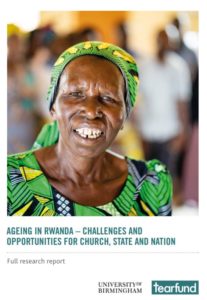[cmsms_row data_classes=”post.cmsms_post_cont_info” data_padding_bottom=”50″ data_padding_top=”0″ data_color=”default” data_width=”boxed”][cmsms_column data_width=”1/1″][cmsms_featured_block fb_bg_color=”#f7f7f7″ animation_delay=”0″]
Our Chair Andrew Larpent recently attended the launch of an important new report by Francis Davis, Emmanuel Murangira, and Madleina Daehnhardt.
The research presented in Ageing in Rwanda – challenges and opportunities for church, state and nation draws on the contributions of a large number of urban and rural Rwandan residents who shared their time, experiences, joys and sorrows during the course of the research in April–May 2019.
The research team is immensely grateful to have been received with such openness of spirit and generosity. Responsibility in accurately reflecting on and interpreting the views of research participants interviewed rests with the authors alone.
- Research subject and method
This study analyses the needs, hopes and agency of older people in Rwanda in the context of a planet that will soon have more older people than under 16s and a nation where the number of over 65 year olds is set to increase threefold to fivefold in the next 20 years. The research makes a small, though new contribution to a relatively scarce literature on ageing in sub-Saharan Africa where theories and practices of development, investment and change have traditionally focused either on younger age cohorts or immersed the ‘greying’ of development challenges, if at all, in a more generic language of ‘vulnerable adults’.
The study assesses:
- The significant and distinctive needs and agency of older people.
- The multi-dimensional contribution – and significant gaps and new risks – that churches and Christian life contribute to supporting and responding to those social, economic, pastoral, psychological and spiritual needs.
- Aspects of Rwanda’s state social protection and health provision – and their gaps.
- How narratives of a ‘young church’ in a ‘young nation’ that champions its young has an impact on the shape, extent and quality of those responses from church and state alike.
- How Rwanda’s emerging landscape of care – the ‘carescape’ – of support that elders face today and in the future is changing and offering new pathways and old patterns in refashioned form.
- Challenges and opportunities for Tearfund’s models and tools, such as the ‘Light Wheel’ walk model of analysis, Church and Community Mobilisation (CCM) approaches and theory of change to initiate, improve upon and sustain appropriate recognition and responses to the needs of older people identified.
The study was commissioned by Tearfund in Rwanda on the basis of an identified need and opportunity to respond to the challenges of old-age poverty. The overall research objective was to establish empirical evidence that will inform a church and community based model for interventions addressing challenges of old-age vulnerability and breakdown in social safety nets for older people in Rwanda.
The primary field research was undertaken in April–May 2019 in one urban and two rural districts of Rwanda. It comprised 14 one-to-one semi-structured in-depth interviews with older people in their homes, and 21 focus group discussions with older women, men, pastors and members of savings self-help groups (SHGs) in each survey area. In total, 121 persons were interviewed. In addition, an adapted observational ‘Light Wheel walk’ on older people in public spaces was undertaken in each research area by research participants. The researchers also interviewed national church leaders and policymakers.
2 Major findings
In summary, the findings of the study show:
- Profound vulnerability, invisibility and intersectionality of needs of older people, despite deep resilience, contributions and agency.
- Very challenging mental health gaps, trauma and stigma affecting older people.
- Gaps in social protection and health policy and WHO advice in regards to older people, despite Rwandan welfare successes.
- Significant faith-based good practice with a huge critical mass of existing progressive action to underpin a renewed strategy and fresh focus on Rwandan older people.
- Gaps in the churches’ understanding of older people and their consequent response.
- Possible weaknesses in the traction of Tearfund’s approaches, such as the ‘Light Wheel’ walk, Church and Community Mobilisation (CCM) and integral mission approaches when it comes to inclusion of older people.
- Local elder abuse and safeguarding risks within churches, and wider NGO safeguarding risks. Gaps in the development of relevant safeguarding policies and codes of conduct in the wider NGO sector when it comes to the distinctive needs of older people.
3 Conclusions and key insights
The traditional narrative of familial care is fragmented and broken, but not entirely replaced by any other coherent form of care or solidarity. A new carescape has emerged and is emerging which is made up of the old and the new. This new carescape in turn presents new pressures. There is everything to play for on the part of church, state and nation.
The report brings forth recommendations to Tearfund in Rwanda and more broadly, to churches in Rwanda and to government as well as to international donors.
There are implications of the findings of the report throughout for church, state and nation, including civil society, both in Rwanda and in membership of wider networks and even the wider sector – for example, Integral Alliance, Micah network, the Disasters and Emergency Committee, and even Caritas International and Missio – and for those supported and advised by DFID, the WHO and other international institutions.
Download your copy here.
[/cmsms_featured_block][/cmsms_column][/cmsms_row]

